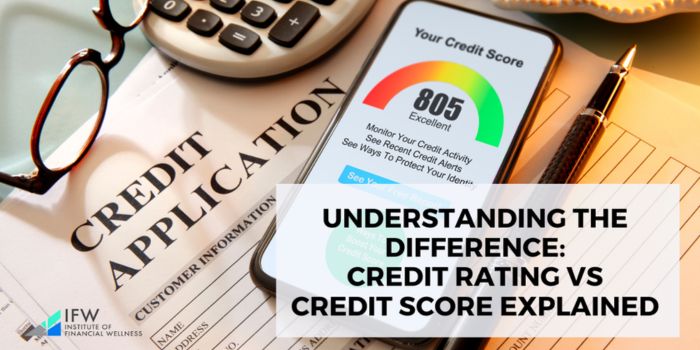“Retirement means giving yourself permission to do nothing at all and not feeling guilty about it.” — Unknown
Confused about whether credit rating vs credit score matters to you? Simply put, a credit rating is a grade assigned to entities like governments or corporations, whereas a credit score is a metric that determines an individual’s creditworthiness. Are you ready to demystify these financial evaluations, unpacking the role they play for borrowers and investors alike? It’s vital knowledge for anyone looking to get a loan, use credit, or invest wisely!
Want to maximize your retirement savings? Learn how The IFW’s Retirement Roadmap Services can guide you to financial freedom!
Key Takeaways
- Credit ratings are primarily for entities like corporations and governments, indicating their financial health and reliability to lenders, while credit scores are a numerical reflection of an individual’s or small business’s credit risk based on their credit history.
- Credit scores, specifically FICO scores, encompass several factors including payment history, credit utilization, credit account age, types of credit, and new credit inquiries, with payment history and credit utilization being the most influential components.
- Credit ratings are categorized, ranging from high investment grade ‘BBB’ to non-investment grade or ‘junk status’, which influence borrowing costs and interest rates for businesses; maintaining a good credit rating is crucial as it can affect a company’s financial stability and borrowing capabilities.
Unraveling the Mystery: Credit Rating vs Credit Score Defined
At first glance, credit ratings and credit scores might seem interchangeable. But while they both assess creditworthiness and risk, they serve different purposes and cater to different entities. Credit ratings are typically assigned to entities like corporations and governments, while credit scoring is applied to individuals and small businesses.
This distinction is vital to understand as we delve deeper into these financial assessments.
What is a Credit Rating?


Before we delve into the intricacies of credit ratings, let’s take a moment to understand what they are essentially. A credit rating is a measure used by potential lenders to evaluate the creditworthiness of businesses or governments. Think of it as a report card for these entities, providing an overview of their financial health and reliability.
These ratings are usually expressed in letters like AAA or BB, forming a unique language that lenders and investors understand. This rating system enables them to make informed decisions about where to place their investment or whom to lend their money. The higher the rating – the lesser the risk, making it a crucial factor in the financial world [1].
What is a Credit Score?

While credit ratings are for businesses and governments, credit scores serve a similar purpose for individuals. A credit score is a three-digit number that reflects an individual’s credit risk. It is based on their credit history. It’s like a financial fingerprint that gives lenders a snapshot of how likely you are to repay your debts.
One of the most commonly used credit scores is the FICO score, a specific type of credit score that lenders use to assess a borrower’s creditworthiness. So, when you apply for a credit card or a loan, the lender will likely check your FICO score to determine whether you’re a safe bet.
The Mechanics of Credit Scores
Now that we’ve defined a credit score let’s delve into the mechanics of calculating it. Credit scores, particularly FICO scores, are based on a proprietary model utilizing five key factors:
- Payment history
- Credit utilization
- The age of credit accounts
- The mix of different types of credit
- The number of credit inquiries or new credit accounts
All of these factors come together to form your credit score.
Key Factors in Credit Scoring

Among the factors that influence your credit score, payment history holds the greatest weight. It becomes crucial to consistently pay your bills on time as it forms the largest factor influencing FICO and VantageScore credit scoring systems. This record of punctuality provides lenders with confidence about your reliability.
On the other hand, credit utilization or amounts owed is the second most influential factor in the FICO scoring model. Keeping your credit card balances low and maintaining less than 30% of credit limits on cards can significantly improve your credit scores [2]. This reflects responsible credit utilization and signals to lenders that you manage your credit well.
Variations in Scoring Models
It’s important to remember that credit scores may vary depending on the source. This is because there are multiple scoring models used by providers, and not all lenders report information to all three consumer reporting agencies. So, your credit score could be slightly different when checked through different sources.
Despite these variations, the FICO score is the most commonly used credit scoring system by lenders. It ranges from 300 to 850, with higher scores indicating lower credit risk. However, there are other credit scoring models like FICO 8, FICO 9, and FICO 10, each with its unique credit scoring model to calculate credit scores [3].
Credit Ratings: Deciphering the Rating Scale
Moving back to the realm of businesses and governments, let’s explore the credit rating scale. Credit ratings are categorized into various levels that inform investors and lenders about the creditworthiness and risk associated with a borrower. This rating scale plays a crucial role in business finance, affecting borrowing costs and interest rates.
Understanding the Rating Scale
The credit rating scale ranges from high investment-grade ratings, starting at BBB, to non-investment grade or junk status, which is below BBB. For example, bonds designated as:
- ‘AAA’
- ‘AA’
- ‘A’
- ‘BBB’
by rating agencies like Standard & Poor’s (S&P), Moody’s, and Fitch are acknowledged as investment grade. These ratings indicate a reduced risk of default, making them attractive to investors and lenders.
On the other hand, securities that fall below the investment grade category are labeled as ‘junk status’. This reflects a higher risk according to the major credit rating agencies. So, if a business receives a ‘junk status’ rating, it may face higher borrowing costs and more stringent loan conditions.
Factors Influencing Credit Ratings
Like credit scores, credit ratings are also influenced by several factors. These include a company’s financial health, debt management, and market conditions. For instance, bonds rated AAA have the lowest risk of default, signifying the highest creditworthiness of the issuing entities.
However, a downgrade in credit rating, particularly from investment grade to ‘BB’, marks a shift to junk status. This indicates a higher likelihood of the company facing difficulties in repaying its debt. Therefore, maintaining a good credit rating is critical for businesses as it impacts their borrowing costs and financial stability.
Credit Reports: The Foundation of Credit Scores and Ratings

While credit scores and ratings are essential, the foundation of these assessments lies in credit reports. These reports contain detailed credit history information and are generated by companies like Equifax, Experian, and TransUnion.
Correcting errors on credit reports can lead to improvements in credit scores if false or outdated negative information is removed. And if all of this sounds a bit confusing, remember that financial advisors can help. Take a look at all the of the ways The Institute of Financial Wellness can help!
Components of a Credit Report
A credit report is much more than just a list of your debts. It contains personal identification information, various types of credit accounts with details like credit limits and balances, and the status of any collection items. Essentially, it provides a comprehensive view of your credit status, which lenders use to assess your creditworthiness.
But that’s not all. Credit reports also include public records, such as bankruptcies, which can significantly impact your credit history for up to a decade. This information can either boost or lower your credit score, making it crucial to review your credit report regularly and ensure its accuracy.
Accessing Your Credit Reports
So, how can you access your credit report? AnnualCreditReport.com is the official site to request a free credit report from each of the nationwide credit reporting companies: Equifax, Experian, and TransUnion. As an alternative to online requests, individuals can also order their credit report by phone or mail through contacting the Annual Credit Report Request Service.
It’s important to note that consumers are entitled to additional free consumer credit reports if they have been denied credit if they believe their report is inaccurate due to fraud, or under other specific circumstances. By obtaining credit reports from different credit bureaus at various times during the year, individuals can monitor their credit more frequently and stay informed about changes in their credit history.
How Lenders Use Credit Scores and Ratings

Now, let’s take a look at how lenders use credit scores and ratings. Essentially, these figures help lenders to gauge borrower risk, affecting the approval, conditions, and pricing of loans and other forms of credit.
Let’s delve a bit deeper into how these rating scores impact personal lending and business finance.
Credit Scores in Personal Lending

In the sphere of personal lending, credit scores play a significant role. They determine your eligibility for credit cards, mortgages, or other lines of credit. A higher credit score translates into a lower risk for the lender, resulting in better credit terms and lower interest rates for you.
For example, for personal loans, particularly mortgages, your credit score can substantially influence the interest rate offered. This impacts your monthly repayments and the total amount paid over the loan’s term. So, maintaining a good credit score can save you money and make your financial journey smoother.
The Role of Credit Ratings in Business Finance
On the other hand, credit ratings hold immense importance in business finance. They impact a business’s borrowing costs, with investment-grade ratings leading to lower interest rates and better terms. Therefore, a good credit rating increases the chance of a business borrowing easily from financial institutions.
However, a downgrade in credit rating can increase borrowing costs and restrict access to capital. For instance, companies with investment-grade ratings can issue bonds at lower interest rates due to the perceived lower risk of default. On the other hand, junk bonds, rated below investment grade, carry higher risk and consequently offer higher interest rates to attract investors.
Improving Your Credit: Strategies for a Better Financial Future
Now that we’ve understood the importance of credit scores and ratings let’s focus on improving them. After all, better credit scores and ratings can open up new financial opportunities and pave the way for a brighter financial future. Whether you’re an individual looking to boost your credit score or a business aiming to enhance your credit rating, there are strategic steps you can take.
Tips for Boosting Your Credit Score
Improving your credit score is not an overnight task, but with consistent effort and strategic actions, it can certainly be achieved. One of the fundamental tactics is to pay your bills on time. Consistently paying bills on time is crucial as it forms the largest factor influencing your credit score.
In addition to on-time payments, here are some other ways to improve your credit scores:
- Keep your credit card balances low, as credit card companies monitor your usage
- Maintain less than 30% of credit limits on cards
- Diversify your credit mix by adding different types of credit accounts, including both revolving and installment credit
Following these tips may help boost your credit score.
Enhancing Your Business’s Credit Rating
For businesses, enhancing your credit rating involves managing debt responsibly and maintaining accurate financial records. A good credit rating can increase your chances of borrowing money and avoid limitations on borrowing.
In addition, resolving negative accounts and disputable items can also improve your business’s credit rating. By using your credit report to identify negatively affecting accounts and taking appropriate actions to resolve them, you can pave the way for a better credit rating.
Navigating Financial Complexities: The Value of the Institute of Financial Wellness
As we navigate the complexities of credit scores and ratings, resources like the Institute of Financial Wellness can be invaluable. The Institute offers:
- A comprehensive multi-media network for financial education, resources, and services
- Engaging educational content
- Retirement Score
- Webinars, such as the Retirement Roadmap Webinar
- Financial check-ups
- Access to a network of financial professionals
The Institute of Financial Wellness is committed to helping individuals and businesses achieve financial success and live their best financial lives.
Full Summary
Understanding the nuances of credit scores and ratings can empower us to make informed financial decisions. These figures are not just random numbers or letters. They’re a reflection of our financial habits and creditworthiness. By maintaining good credit practices, regularly checking credit reports, and making strategic improvements, we can enhance our credit scores and ratings, opening doors to better financial opportunities. Remember, your financial health is a journey, not a destination, and every step toward improving your credit is a step toward a brighter financial future.
Frequently Asked Questions
What is the difference between a credit score and a credit rating?
The main difference between a credit score and a credit rating is that a credit score applies to individuals, while credit ratings are for entities like corporations and governments. Therefore, a credit score is tailored to individuals, whereas credit ratings are for larger entities.
How is a credit score calculated?
Your credit score is calculated based on five key factors: payment history, credit utilization, the age of credit accounts, the mix of different types of credit, and the number of credit inquiries or new credit accounts. These factors play a crucial role in determining your overall creditworthiness.
What does a credit rating represent?
A credit rating represents the creditworthiness of businesses or governments and is used by potential lenders to make evaluations. The ratings are typically expressed in letters such as AAA or BB.
How can I improve my credit score?
To improve your credit score, make sure to consistently pay your bills on time, keep your credit card balances low, maintain old accounts open, and diversify your credit mix. These steps can help you build a stronger credit profile.
How can a business enhance its credit rating?
To enhance its credit rating, a business should manage debt responsibly, maintain accurate financial records, and resolve negatively affecting accounts and disputable items on its credit reports. This will show lenders that the business is financially responsible and capable of managing its debts effectively.




